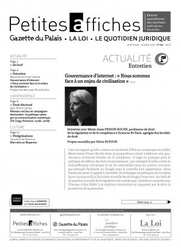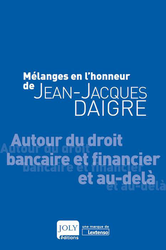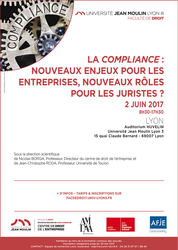July 18, 2019
Interviews

► Référence complète : M.-A. Frison-Roche, M.-A., "Gouvernance d'Internet : nous sommes face à un enjeu de civilisation", Petites affiches, 18 juillet 2019, entretien mené avec Olivia Dufour, à propos du rapport reçu par le Gouvernement le 15 juillet 2019 :
► Présentation de l'entretien par Les Petites Affiches : "Dans le rapport qu’elle a remis au secrétaire d’État au numérique en juillet, Marie-Anne Frison-Roche émet 55 propositions visant à élaborer une gouvernance d’internet fondée sur la compliance. Il s’agit en pratique pour le politique de définir des buts monumentaux : par exemple la lutte contre le réchauffement climatique et de les internaliser dans les acteurs cruciaux, par exemple Facebook ou Google sous le contrôle d’un superviseur. Ainsi Facebook serait-il appelé à surveiller les échanges numériques de la même façon qu’aujourd’hui Euronext surveille les échanges financiers. Au-delà de la question cruciale de la régulation du numérique, l’ambition consiste pour l’Europe à être fidèle à sa tradition humaniste en imposant par le droit la protection de la personne.".
____
____
► Se reporter au Rapport de Marie-Anne Frison-Roche, L'apport du Droit de la Compliance dans la Gouvernance d'Internet, à propos duquel l'interview a été donné.
________
Dec. 11, 2017
Publications

► Référence complète : Frison-Roche, M.-A., Compliance et confiance, in Mélanges en l'honneur de Jean-Jacques Daigre, Autour du droit bancaire et financier, Joly éditions - Lextenso, déc. 2017, pp.279-290.
____
► Résumé de l'article : Compliance. Confiance. Deux mots qui reviennent de plus en plus souvent sous nos yeux de lecteurs ou à nos oreilles d'auditeurs. Et pourtant ils ne semblent pas bien s'assortir. Ils paraissent même se repousser l'un l'autre.
En effet, la compliance est ce par quoi les autorités publiques font confiance à certains opérateurs privés, non pas en eux-mêmes, mais à leurs capacités structurelles à capter mécaniquement l'information dont ces autorités ont besoin (I).
Cela suppose une vision du monde dans lequel les entreprises sont puissantes et sont seules puissantes mais ne sont pas vertueuses, tandis que les autorités publiques, comme le Ministère public ou les régulateurs, sont faibles mais sont seuls vertueux. Une telle conception de la compliance transforme les entreprises en automates. Une telle vision du monde n'a pas d'avenir : on ne peut faire confiance qu'à des êtres humains, dont il faut accepter le caractère faillible, la compliance étant alors l'expression d'un rapport noué sur une confiance qui se donne à voir entre des opérateurs non mécaniques, à savoir les institutions publiques et les opérateurs privés qui peuvent l'un et l'autre avoir en commun souci d'un intérêt qui les dépasse et que l'on appelait naguère l'intérêt général (II).
____
🚧 Lire le document de travail bilingue servant de base à l'article ici publié.
____
Lire une présentation générale de l'ouvrage dans lequel l'article est publié.
____
____
June 2, 2017
Conferences

Reférence complète : Frison-Roche, M.-A., Les fonctions de la Compliance. Un choix politique à faire ("The functions of Compliance. A political choice to do"), in Borga, N. et Roda, J.-Ch. (dir.), La compliance : nouveaux enjeux pour les entreprises, nouveaux rôles pour les juristes ? ("Compliance: new challenges for companies, new roles for lawyers?"), Centre du Droit de l'entreprise Louis Josserand, Université Lyon IIII Jean Moulin, France, Lyon, 2 juin 2017.
Summary of the conference :
Compliance mechanisms are being constituted in "Compliance Law", new branch of Economic Law. Its functions are determined by the goals. But the goals are "monumental", since it is nothing less than the end of corruption, trading in influence, arms trafficking, international terrorism, trafficking in human beings, selling of human organs, the effective safeguard of environmental protection, safeguarding the planet, access to culture for all, preservation of civilization, the effectiveness of human rights ...
The goals of a company are not a priori of this order, even if every firm understands that it is clever to appear amiable.
By comparing the two types of goals, a difference of nature is measured.
By the Compliance Law, companies are therefore invited to "get out of themselves.
Consequently, the functions that shape the contours of Compliance Law transform those who are the "subjects of law", the enterprises: these are the subjects, insofar as they are agents of legality. But this can not be the case for all companies.
If the effect of Compliance were to be generalized to all companies, this would be catastrophic and would make no sense.
However, who firmly and precisely drew the circle of "legal subjects eligible to be the legality agent" of Compliance? With the considerable costs and responsibilities that go with it?
If it has not been the Legislator, it will have to be the Judge. Because the judge is guardian of the spirit of Law and guardian of legal orders. Especially if it is a global legal order.
___
Moreover, companies are not only passive subjects of Compliance Law - which would be the case of a misunderstood Compliance Law - but are also active subjects of Compliance Law. Indeed, these "monumental goals" which draw the functions of the Compliance are exactly the same as those of the Corporate Social Responsibility.
Thus, if the Compliance is conceived of only as an immense and empty submission of all undertakings to total regulation, the result will be an opposition between the regulatory power and the will of undertakings, a concrete opposition between public authorities and companies. If, on the other hand, we conceive Compliance Law as that by which "crucial enterprises" like the Regulators are moving towards the realization of "monumental goals, then Compliance Law crystallizes a" Trust Pact""between the two, Which goes beyond the borders and becomes a means of regulating globalization.
This second conception is the future of European Law.
____
See the slides (in French).
Read the working paper on which the conference is based (working paper in English)
Feb. 2, 2017
Conferences

Référence : Frison-Roche, M.-A., Le droit de la
Le Droit de la
En effet, les autorités publiques expriment des buts monumentaux dépassant le fonctionnement marchand et qu’elles n’ont pas les moyens de mettre en œuvre mais dont elles chargent certaines entreprises de la concrétisation. Ainsi, la
Face à ce phénomène américain, les entreprises européennes sont restées passives, se contentant d’être condamnées. Il convient bien plutôt de s’approprier ce Droit de la
Enedis est à ce titre un sujet dynamique de
Feb. 10, 2011
Publications

Référence complète : FRISON-ROCHE, Marie-Anne, The auditor, a crucial player on financial markets, The Journal of Regulation, n°6, January / February 2011, I-1.26, p.470-479.
Cet article est écrit en anglais.
La Commission européenne par un Livre Vert d’octobre 2010 envisage une nouvelle politique de l’audit pour favoriser la stabilité financière. Pour cela, elle dessine le rôle de l’auditeur sur les marchés financiers, allant jusqu’à lui demande de prévenir les investisseurs des risques financiers que présentent les émetteurs. Mais l’auditeur a un rôle de certification des comptes, ce qui doit en être distinguer et cette "attente de marché" doit être satisfaite par d’autres, comme les agences de notation. Cependant, l’auditeur est un agent "crucial", en ce que son action est déterminante pour les investisseurs. Mais il n’est pas pour autant "systémique" et ne s’assimile en rien à une banque, puisque sa défaillance n’entraine pas d’effet domino. En outre, parce qu’il est crucial, l’ouverture forcée du marché de l’audit à plus de concurrence fragiliserait la bonne réalisation de son rôle dans le système. Cela est une nouvelle illustration de l’opposition entre la concurrence et la régulation.
June 4, 2002
Thesaurus : 05. CJCE - CJUE
Full reference: CJCE, 4th of June 2002, Decision C-483/99, Commission v/ France (Total)